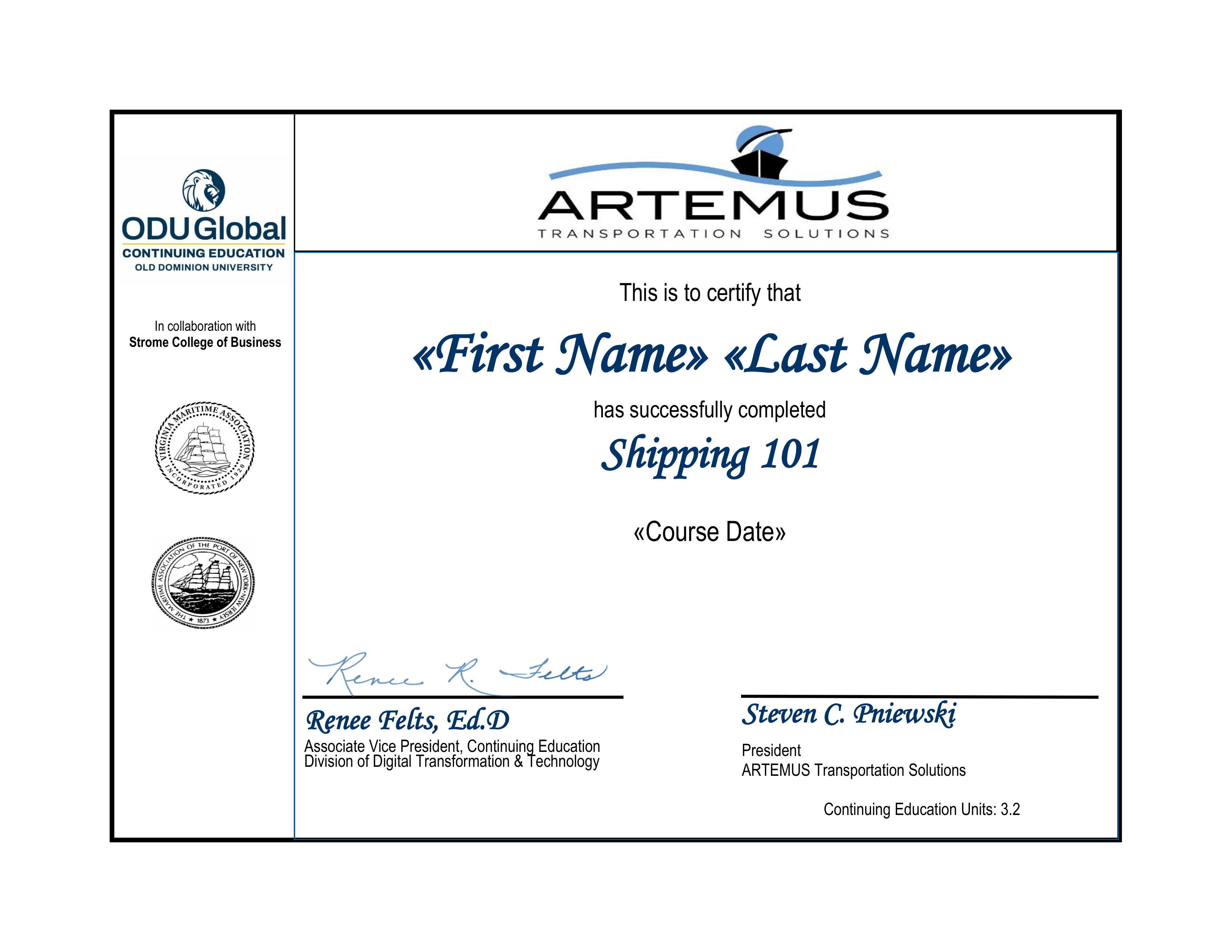Course Overview
Gain in-depth knowledge of the global shipping industry, from the evolution of containerized shipping to vessel types & cargo handling.
- History Of Container Shipping
- Evolution Of Cargo Transport
- Types Of Vessels & Cargoes
- Export & Import Processes
- Global Trade Regulations Overview
- Efficient Logistics & Compliance
What You Will Learn
In this course, you’ll explore the history & evolution of containerized shipping, understand various vessel types, & master the export-import shipping cycle. Gain insights into global trade regulations & learn how to streamline logistics for compliance & efficiency.
History Of Container Shipping
Discover how containerization revolutionized global trade by drastically improving shipping speed, reducing costs, & streamlining operations across various industries.
Evolution Of Cargo Transport
Learn about the advancements in cargo transport, tracing its development from traditional methods to modern, technology-driven solutions that meet the demands of international trade.
Types Of Vessels & Cargoes
Understand the variety of vessels used in global shipping & the specialized cargo they transport, ensuring safe & efficient operations in different sectors.
Export & Import Processes
Master the complete workflow of exporting & importing goods, from essential documentation to navigating customs regulations & clearance procedures.
Global Trade Regulations Overview
Gain a thorough understanding of the international trade laws & regulations that guide & control shipping practices, ensuring compliance & smooth operations worldwide.
Efficient Logistics & Compliance
Learn practical strategies to enhance shipping logistics, focusing on efficiency & maintaining adherence to global compliance standards & regulations.
By Artemus Transportation Solutions
With a dedicated legacy since 2004, Artemus Transportation Solutions has become a trusted leader in transportation compliance solutions, offering cutting-edge ISF, AMS, Customs Broker, & eManifest Canada & Japan AFR software. Our years of hands-on industry experience allow us to deliver impactful training courses that go beyond theory, empowering professionals with real-world knowledge.
- 19+ Years of Expertise in Global Transportation Compliance Solutions.
- Practical, real-world insights into Customs, Import, and Export processes.
- Hands-on training in managing complex transportation equipment logistics.
- Efficient solutions for navigating International Shipping and related challenges.

Recognized Certification From Artemus Transportation Solutions
Upon completing the International Shipping course, you'll receive a Certificate of Completion from Artemus Transportation Solutions. This certification highlights your expertise in global shipping processes & compliance, making it a valuable addition to your skills.

Our Reviews
Frequently Asked Questions
Who Is The Course Designed For?
This course is tailored for professionals at all levels, from beginner to intermediate learners, who are looking to enhance their knowledge of global shipping, logistics, & compliance.
What Does The International Shipping Course Cover?
The International Shipping course provides in-depth knowledge of the global shipping industry, covering the history of container shipping, vessel types, cargo handling, export/import processes, global trade regulations, and logistics compliance.
What Is The History Of Container Shipping Covered In This Course?
The course explores the history of container shipping, including its evolution from traditional cargo transport methods to modern containerized systems, which revolutionized the shipping industry and global trade.
Will I Receive A Certification Upon Course Completion?
Yes, you’ll receive a Certificate of Completion from Artemus Transportation Solutions, which can be showcased on your professional profiles.
Are The Courses Self-Paced Or Instructor-Led?
This course offers a flexible, self-paced learning format with video pre-recorded lessons, allowing you to complete them at your convenience. This approach enables you to learn at your own pace & revisit material as needed.
Do I Need Prior Experience In Shipping Or Logistics To Take This Course?
While prior experience is helpful, our beginner & intermediate-level courses provide foundational knowledge, making them accessible even for those new to the industry.
How Can This Course Benefit My Career?
By completing this course, you’ll gain practical, real-world insights that can boost your skills, enhance your compliance knowledge, & advance your career in the shipping & logistics industry.
What Makes Artemus’s International Shipping Course Different From Other Shipping Courses?
Artemus’s International Shipping course stands out by offering a comprehensive, real-world approach to global shipping. Unlike other courses, it covers both the historical evolution of shipping and the latest industry trends, providing a complete understanding of containerized shipping, vessel types, cargo handling, and international regulations. The course blends theoretical knowledge with practical insights, ensuring that learners are equipped to handle the complexities of global trade and logistics.
International Shipping Course: Understand global trade topics and compliance concepts
Shipping container pricing: how much is a shipping container?
The cost of a shipping container varies based on size, condition, and location. Prices range from $1,500 to $5,000 for standard 20ft and 40ft containers . New containers are more expensive, while used ones can be more affordable. Additional costs may include delivery fees and modifications.
Shipping container pricing: how much does a shipping container cost?
A new 20ft shipping container typically costs between $2,000 and $4,000, while a 40ft container ranges from $3,500 to $7,000. Prices fluctuate based on global demand, steel prices, and availability in different regions.
How much do shipping containers cost? understanding shipping container costs
The price of shipping containers depends on whether they are new, used, or refurbished. Used containers can be bought for as low as $1,500, while high-quality new ones cost upwards of $5,000. Additional costs may arise for insulation, security features, or customizations.
Interior space: how many square feet inside a shipping container?
A standard 20ft shipping container has approximately 160 square feet of interior space, while a 40ft container offers 320 square feet. High cube containers provide extra height, increasing total cubic capacity.
Cost variations: how much are shipping containers?
The cost varies based on container type, condition, and location. New containers range from $2,000 to $7,000, while used ones can be as low as $1,500. Specialty containers, such as refrigerated or high-cube models, are priced higher.
Standard dimensions: how wide is a shipping container?
Standard shipping containers have a width of 8 feet (2.44 meters). High cube containers have the same width but offer additional height for greater storage capacity.
Do shipping containers float? buoyancy explained
Empty shipping containers can float due to the trapped air inside. However, once loaded with cargo, they become too heavy and will sink if submerged.
How big is a shipping container? size guide
The most common sizes are 20ft and 40ft. A standard 20ft container measures 20 feet long, 8 feet wide, and 8.5 feet high, while a 40ft container is twice as long with the same width and height.
How much does a shipping container weigh? weight details
An empty 20ft container weighs about 5,000 lbs (2,268 kg) , while an empty 40ft container weighs around 8,000 lbs (3,630 kg). Loaded containers can weigh up to 30,000 kg (66,000 lbs) depending on the cargo.
Where to buy shipping containers? buying guide
Shipping containers can be purchased from container suppliers, shipping yards, logistics companies, and online marketplaces. Buyers should check local regulations and transportation costs before purchasing.
Container ship capacity: how many containers are on a container ship?
Container ships can carry anywhere from 1,000 to over 24,000 TEUs (Twenty-foot Equivalent Units), depending on their size. The largest vessels, such as Ultra Large Container Ships (ULCS), can transport over 20,000 TEUs .
Weight specifications how much does a 20ft shipping container weigh?
An empty 20ft shipping container weighs about 5,000 lbs (2,268 kg) . When fully loaded, it can weigh up to 60,000 lbs (27,000 kg) .
How big are shipping containers? most common sizes
Shipping containers typically come in 20ft, 40ft, and high cube (9.5ft height) options. Special sizes, like 10ft and 45ft containers, are also available for specific cargo needs.
How high is a shipping container? height considerations
A standard shipping container is 8.5 feet (2.59 meters) high, while a high cube container is 9.5 feet (2.89 meters) high, offering more vertical space.
How many containers on a cargo ship? know the shipping capacity
Cargo ships vary in size, with smaller feeder vessels carrying around 1,000–3,000 TEUs, while the largest container ships can transport over 24,000 TEUs.
How many containers on the Baltimore ship?
The Baltimore ship, Dali, was capable of carrying around 10,000 to 12,000 TEUs before the incident that caused structural damage.
How many containers on the dali ship?
The Dali ship had the capacity for around 10,000–12,000 TEUs and was actively involved in global trade before its accident.
How tall is a shipping container? structural specifications
A standard shipping container is 8.5 feet tall, while a high cube container is 9.5 feet tall, allowing for additional storage capacity.
How to buy a shipping container? the buying process
Shipping containers can be purchased through local dealers, port storage facilities, auction sites, and logistics providers. It's essential to check for quality, certifications, and local zoning laws.
What are the dimensions of a shipping container? dimension breakdown?
A standard 20ft container is 20’L x 8’W x 8.5’H, while a 40ft container is 40’L x 8’W x 8.5’H. High cube versions offer an additional 1 foot in height.
How many containers are on a ship? the ship capacity
Container ships can hold between 1,000 and 24,000 TEUs, with Ultra Large Container Ships (ULCS) carrying the maximum capacity.
Weight breakdown: how much do 40-foot shipping containers weigh?
An empty 40ft container weighs about 8,000 lbs (3,630 kg). When fully loaded, it can weigh up to 67,200 lbs (30,480 kg).
How much does a 20-foot shipping container cost?
The cost of a 20ft container ranges from $2,000 to $4,000 for new units and $1,500 to $2,500 for used ones, depending on location and condition.
How much does a 40-foot shipping container weigh?
An empty 40ft container weighs approximately 8,000 lbs (3,630 kg), while a fully loaded container can weigh up to 67,200 lbs (30,480 kg).
What size are shipping containers?
Common container sizes include 10ft, 20ft, 40ft, and 45ft. High cube versions provide extra height for more storage capacity.
How many containers can a ship hold?
Container ships range in size from small feeder vessels carrying 1,000–3,000 TEUs to Ultra Large Container Ships (ULCS) transporting over 24,000 TEUs.
What are shipping containers made of?
Shipping containers are made from Corten steel, a corrosion-resistant metal that withstands harsh weather and long sea voyages.
How many containers can a ship carry?
A standard container ship can carry from 1,000 to over 24,000 TEUs, depending on its size and design.
How many containers fit on a container ship?
The capacity of a container ship depends on its size, ranging from small feeder ships (1,000–3,000 TEUs) to ULCS ships (24,000+ TEUs).
How much does a 40-foot shipping container cost? pricing guide
A new 40ft shipping container costs between $3,500 and $7,000, while used containers range from $2,500 to $4,500.
How much does a shipping container cost to purchase? pricing guide
Prices range from $1,500 to $7,000, depending on size, condition, and location. Specialty containers cost more.
How long are shipping containers? length variations
Standard lengths include 10ft, 20ft, 40ft, and 45ft, with 20ft and 40ft being the most common.
FAQs
-
What factors affect the cost of a shipping container?
The price of a shipping container depends on several factors, including size, condition (new or used), location, global steel prices, and availability. Additional costs may include delivery fees and modifications such as insulation or security enhancements.
-
Can i buy a used shipping container?
Yes, used shipping containers are available for purchase and are often more affordable than new ones. They typically range from $1,500 to $3,000, depending on their condition and location. Be sure to check for structural integrity and signs of rust before purchasing.
-
What are the standard sizes of shipping containers?
The most common shipping container sizes are:
- 20ft Container: 20’L x 8’W x 8.5’H (160 sq. ft. of space)
- 40ft Container: 40’L x 8’W x 8.5’H (320 sq. ft. of space)
- High Cube Containers: Offer an additional 1 foot in height for extra storage capacity.
-
How much does a shipping container weigh?
- Empty 20ft container:Empty 20ft container: ~5,000 lbs (2,268 kg)
- 40ft container: ~8,000 lbs (3,630 kg)
- Fully loaded containers: Can weigh up to 66,000 lbs (30,000 kg), depending on the cargo.
-
How long do shipping containers last?
With proper maintenance, a shipping container can last between 20 to 30 years. New containers have a longer lifespan, while used containers may require occasional repairs.
-
Where can i buy a shipping container?
You can purchase shipping containers from:
- Container suppliers
- Shipping yards
- Logistics companies
- Online marketplaces
Make sure to verify the container’s condition before buying.
-
Can shipping containers be customized?
Yes, shipping containers can be modified for different uses. Popular customizations include adding insulation, ventilation, windows, doors, shelving, and electrical wiring.
-
Do i need a permit to place a shipping container on my property?
Regulations vary by location. Some areas require zoning permits or compliance with building codes, especially if using the container for storage or living purposes. Check with your local authorities before purchasing.
-
Can shipping containers be used for housing or offices?
Yes! Shipping containers are increasingly used for homes, offices, pop-up shops, and storage spaces due to their durability and adaptability. Custom modifications can transform them into fully functional structures.
-
How are shipping containers delivered?
Shipping containers are typically delivered using a flatbed truck, tilt-bed truck, or crane truck. Delivery fees depend on the distance from the supplier to your location.














